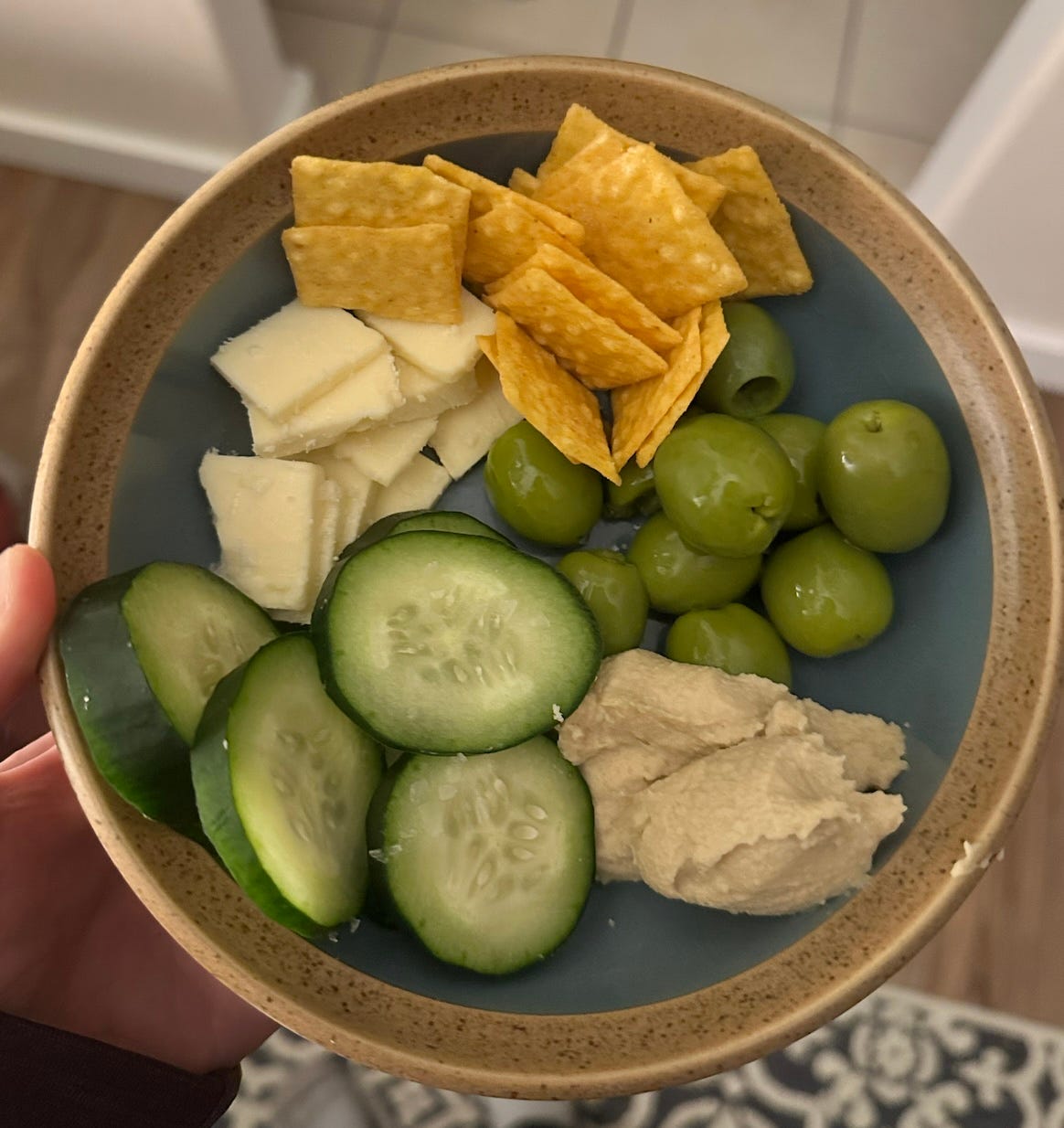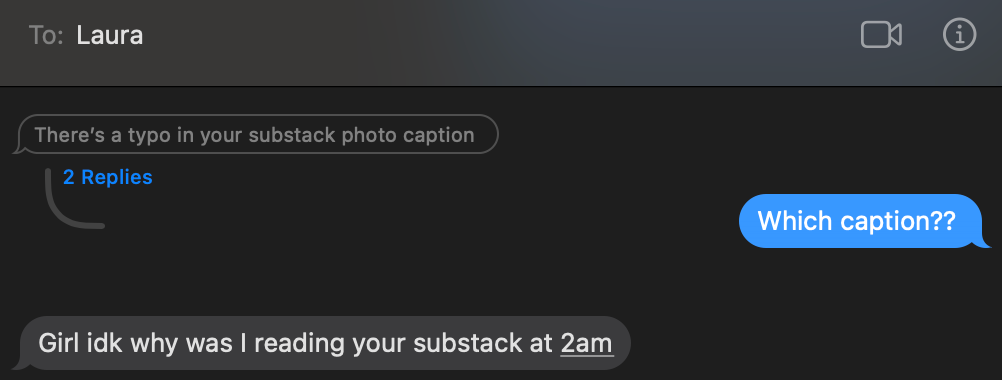I Don't Care About the Ways You Use ChatGPT
Please stop bragging about "how much time it saves." I'm not impressed
When someone tells me they used ChatGPT to help do their job or replace basic critical thinking skills, I usually respond with a two-syllable grunt that goes up at the end. "Mm-HMM!”
But if they continue to regale me with the wonders of AI, I am unable to fake it and will cut them off with something simple and unpleasant:
“Sorry, I don’t like ChatGPT and I don’t use it.” (I’m fun at parties).
This is invariably followed by a frantic hand wave and rushed explanation telling me the way they use ChatGPT is actually helpful. If I just used it this way I would love AI.
“I know AI bad for creatives, but I saved five hours because ChatGPT wrote my emails and created a logo for my dog-sitting business!” Ignoring my glazed expression, the other person gets more excited about their cheat code, and they exit the interaction satisfied with having helped a tech-averse bog hag See The Light.
But it hasn’t worked. I still loathe AI and the only result I glean from their proselytizing is an eroded respect for their work.
I hated the idea of ChatGPT the moment I heard about it in 2022. This was around the time that people were replacing social media avatars with cartoonified versions of themselves as weirdly shiny medieval knights, fairies, and cyberpunk warriors.
That looks dumb, I thought. I hope this isn’t the first step of a ubiquitous and vaguely sinister technology that will destroy the planet and compromise critical thinking.
In reality, I could never have predicted that within 18 months, Instagram would be offering AI rewrites of my banal captions, Hollywood studios would be experimenting with AI throughout production, and an adjunct professor friend would be telling stories of her students using ChatGPT to write one-paragraph personal introductions. One-paragraph personal introductions.
I hate AI for many reasons, but my palatable argument (for when I don’t want to spiral into intellectual ethics) is the environmental impact. AI prompts use exponentially more energy than a standard Google search, with researchers estimating that each string of prompts uses about 16 ounces of water via data center humidification systems.
I did read rumors about California running out of water for fighting wildfires because of those AI data centers, and as far as I can tell, that one isn’t true. The lack of water is at least partially due to damaged electrical systems negatively impacting water flow, and that their infrastructure was based on water usage for urban fires, not wildfires burning in urban areas. Simply put, the fires are too big.
Still, I want to know how we can fathom mismanaging water at all, especially as the extreme wildfires are largely impacted by drought conditions.
Speaking of AI data centers, the Biden administration recently proposed using federal land to house more of them. I feel insane, but isn’t this a step in the wrong direction for conservation and land management? And to what end? So we can see what we’d look like as a Lord of the Rings elf?
We’re barely two years into AI’s global debut and it feels inescapable. Even when I fact-checked that stat on water usage, the first thing Google gave me was an AI summary.
Here’s a fun tip: if you don’t want to see AI results, just add udm=14 to the end of your search query. Like this:
I’m not denying that AI results are made to be useful. I just believe that doing things the easiest way possible just because we can means bad things for our attention spans, curiosity, critical thinking, and intellect.
Take the silly olive example above. I used the query line to eliminate AI results, which brought me to a robust article from Serious Eats. I would have figured out the olive variety in .02 seconds from an AI result, but from the article, I learned that olive trees were one of the first to be harvested (8,000 years ago), I was seeking the Castelvetrano variety, and I learned a fun new word: drupe.
I’m not trying to lecture you from a soapbox of olive lore, but in just a few minutes, I read something from a real writer who went through an editorial process with a team that worked hard to get it to publication. That’s worth something to me.
While most of us have more pressing things to do than learn about the history of olives, what about drafting a letter of recommendation? Writing the intro to a news article? Designing a travel itinerary? Bedtime stories for your kids? These are all recent things people have bragged to me about using ChatGPT for. None of it impresses me, I don’t care how much time you saved.
Once you start taking shortcuts, how do you decide when to stop? Sure, I could probably get away with using ChatGPT to write the fluff sections of my gear reviews. While it would likely read similar to my real writing (OpenAI has likely indexed my work for generative training), my integrity lies in my efforts, and my efforts are worth the time.
Regarding intellectual property ethics, I have no doubt that my work—both creative or commercial—has been used to train AI. Preventing your work from being used to train AI is a muddy process, and there are few regulatory protections as of now. See the furor over OpenAI using a voice that sounded suspiciously like Scarlett Johansson. If she’s getting put through the wringer, generic commerce writers don’t stand a chance.
I believe that ChatGPT can streamline work flow and make tasks easier. But are we not bothered by the lack of thought and effort and critical thinking? Why is this something to celebrate?
Our brains like to stretch, learn, and grow. A society who doesn’t read or show interest in the world is doomed to stasis and is more likely to believe without question a three-sentence AI summary at the top of the search results.
I know I’m not alone in my hopelessness over the rampant adoration for ChatGPT, but it feels I’m living on a shrinking island.
Most people in my social circle use ChatGPT. This means everything from generating potluck themes to articles headlines to cover letters. Maybe I’m alone on the island, but brainstorming dinner themes is fun, writing headlines is part of my job, and what is life without suffering (writing cover letters)?
I find it disheartening how willingly people have relinquished effort and ingenuity in the name of reducing intellectual obstacles. Our brains were programmed to face challenges and gain confidence through problem solving. The effort of creating is part of what makes completion so satisfying, even if the results are imperfect.
Imagine a world where all art, stories, movies, and ideas are generated by a machine’s amalgamation of the art, stories, movies, and ideas that at one point came from actual people. It’s bleak, isn’t it?
Is this how Boomers felt when youngsters began using the internet instead of reference books? My first “research paper” was about alligators, hand-written using carefully transcribed notes from Encyclopedia Brittanica CD-Roms on an ancient Mac. I also dragged a stool over to the non-fiction shelves of the local strip mall library, biking home with a load of hardcovers on my glittery purple Schwinn.
This is to say that obviously technology has progressed in my lifetime, and I don’t feel depressed about most of it. I had no moral quandary about jumping from the Dewy Decimal System to Google. But it makes me think that perhaps the generation above me felt a sense of loss.
I’m not trying to offend people who use AI (unless you’re stealing art, in which case yes I am). If streamlining your life is your prerogative, go for it. Just please stop bragging about it to me. This is the hill I’m dying on, and if it cements me as a crotchety 1900’s cat lady who complains about technology, fine. I reached this era years ago with my plants, throw pillows, and bird feeders.
And as for this newsletter, it will never be written by AI. You can tell by all the typos xoxo.
Like this post? Buy Maggie a coffee!















Yes for real, I'm dying on this hill too
Thank you for writing this. I have also felt alone in my contempt for AI and sickened by what’s to come. I hate that it already seems inescapable